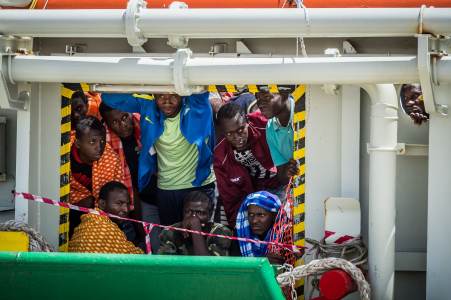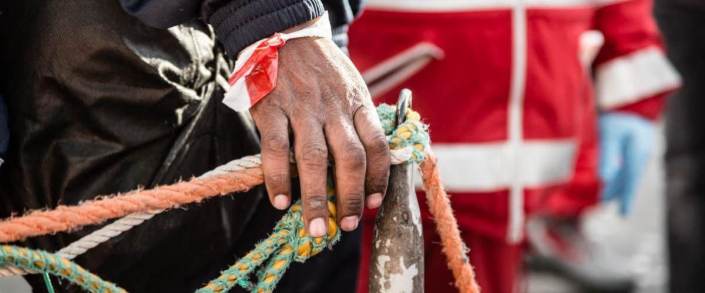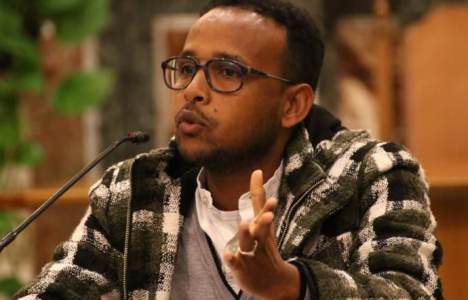Oxfam – Borderline Sicily: Libya, Endless Hell
One year after the Italy-Libya agreement on migration, the new report by Oxfam and Borderline Sicily collects evidence of death and torture in Libya.
To the Italian government: we demand the immediate revocation of the agreement that generates suffering and does not respect the International Law.
Rome, 1st February 2018 – Hundreds of thousands of people are still trapped in Libya, in detention centres and subjected to all kinds of abuses. A year after the Italy-Libya agreement, supported by the European Union, created in order to stop the irregular flow of migrants, Oxfam and Borderline Sicily have gathered in the new report Libia, inferno senza fine dramatic testimonies of men, women and children, that successfully managed to escape and arrive in Italy, confirming abductions, murders, rapes, forced labour.
The agreement envisaged that Italy – together with the EU – provided financial and logistical support to the Libyan coast guard with the aim of preventing departures from Libya and bringing back those who had tried to do so. The agreement’s objective was also to support the land border control system of southern Libya and the adaptation and financing of reception centres through the supply of medicines and medical equipment.
Oxfam and Borderline call for the immediate revocation of the agreement and all activities aimed at bringing back to Libya the people who managed to escape from detention camps and inhumane living conditions, including those carried out in collaboration with the Libyan Coast Guard.
On the 2nd February 2017, Italy signed a Memorandum of Understanding with the national unity government of Tripoli, which was approved the following day by the heads of state and government at an informal meeting in Malta. This agreement does not respect Human Rights nor does it comply with International Law. Furthermore, Libya has never signed the 1951 Refugee Convention, which protects people fleeing war and persecution.
The central Mediterranean route remains the most dangerous in the world
The Italian Government has repeatedly emphasized how the agreement was signed primarily to put an end to the deaths at sea and to journeys of hope managed by human traffickers; however the mortality rate in the central Mediterranean route has not changed significantly. Today the route is the most dangerous in the world with 2.38% of victims in 2017 (on the total number of landings) compared to 2.52% in 2016. And 2018 hasn’t started well with 185 deaths, equal to 5.1%. Not even the fight against traffickers seems to have taken decisive steps: in many coastal areas of Libya the departures continue as if nothing had happened.
” The strengthening of the Libyan Coast Guard’s work by the Italian government did not reduce the number of deaths at sea. – said Paola Ottaviano, from Borderline Sicily – Only in January it is estimated that at least 185 people have lost their lives in the Mediterranean. The number relating to the decline of arrivals in Italy, celebrated as a political success, is equivalent to the number of people reported within the same centres from which they fled after having suffered serious human rights violations.”
In this context it should also be considered that all attempts by the African Union, the EU and the UN to free migrants from the Libyan detention centres are laudable, but insufficient, because they do not concern the majority of people trapped in Libya. The authorities of the country recognize in fact the dignity of international protection only to a few nationalities.
The EU should work for the release of detainees in Libya
” The people we have talked to escaped from war, persecution and poverty – said Roberto Barbieri, general manager of Oxfam Italy – In Libya they are forced to face yet another hell. European governments have a duty to protect everyone’s human rights, including those of migrants. Those who can leave Libya should never be brought back. This is why we believe that Italy’s and the EU’s support for the Libyan coast guard is a further disfigurement. The agreement with Libya is a failure, exposing hundreds of thousands of people to unspeakable suffering. – added Barbieri –We ask for its immediate revocation. We need a new agreement to be signed only when the Libyan regulatory framework is able to guarantee the protection of refugees and vulnerable migrants. Instead of preventing departures from Libya, the EU must find a way to free all those who are detained, regardless of their nationality “.
After years of conflict, Libya is a seriously destabilized country, where – according to the United Nations – 1.3 million people need humanitarian assistance, among displaced Libyans and hundreds of thousands of migrants arrived to work or in transit to other countries looking for security and dignity.
Last August, in a report based on direct testimonies (158 interviews), Oxfam and its partners Borderline and MEDU (Doctors for Human Rights) reported that 84% of those involved had undergone inhumane treatment, violence and torture in Libya. 74% reported having witnessed murder and torture. The new testimonies collected by Borderline, after the Italy-Libya agreement on migration, explains that the situation has not changed: kidnapping for money, men forced to work without being paid, women raped and reduced to a state of sexual slavery. A witness reported children sold as slaves.
The story of the abuses suffered
Precious, 28, Nigerian
“When I arrived in Tripoli I was imprisoned. There were women and men along with me. They asked for money that we did not have and treated us like waste. We ate once a day, a little rice or uncooked pasta and drank the water from jerry cans that had contained gas. Some people died of illness and beatings while I was there. We women were beaten up and raped every day and only fed after the violence. “
Blessing, 24, Nigerian
“ After the terrible journey in the desert I hoped that in Libya the situation would have been better than what I had lived. I thought I would be employed as a maid in a house of Arabs, as I had been told. Instead, they took me to a centre, where I stayed for many months. They gave me a handful of rice every day; they poured it on my hands. They sold my body to Arab men and I could not escape. When I tried to do it I was brutally beaten and raped […] “.
Francis, 20, Gambian
“I was kidnapped by a criminal gang. They took us to a big room where there were 300 of us. I stayed there for 5 months. Every day they forced us to work for them and those who opposed were killed. […]. Women were beaten and raped; the boys kept in prison and sold as servants to Libyan families “.
“Europe will not solve the problem of migration by pushing the border further towards Libya, and not even bringing back desperate people back to the hell from which they fled. – concluded Barbieri – It should instead ensure safe routes for all those fleeing from areas of the world where life is impossible and guarantee fair and transparent asylum applications “.
Oxfam Press Office Italy
Maria Teresa Alvino – 348.9803541 – mariateresa.alvino@oxfam.it
David Mattesini – 349.4417723 – david.mattesini@oxfam.it
Notes:
– the report ‚Hell beyond the sea‘ by Oxfam from August 2017 is downloadable here
– Oxfam Italy assists migrants in Italy by distributing food, clothes, shoes, and first aid kits. It offers psychological assistance to the most vulnerable, legal support and Italian language classes to asylum seekers; with local administration offices it works on the reception practices in different Italian municipalities.
– Oxfam wishes to point out that the European Union uses resources which are meant for public aid for development to manage the migratory crisis, externalizing frontiers, as the use of the Trust Fund Africa demonstrates. In a recent analysis carried out with Openpolis, Oxfam shows that a growing sum of public development aid stays in rich countries, where it is used to manage the reception of refugees and asylum seekers. This aid sum is literally exploding, the reason why the funds that are stated as destined to promote the development of poor countries in reality stay in Italy.
– The names of the testimonies are made up out of security reasons.
Translation: Ines Fanlo Morales




